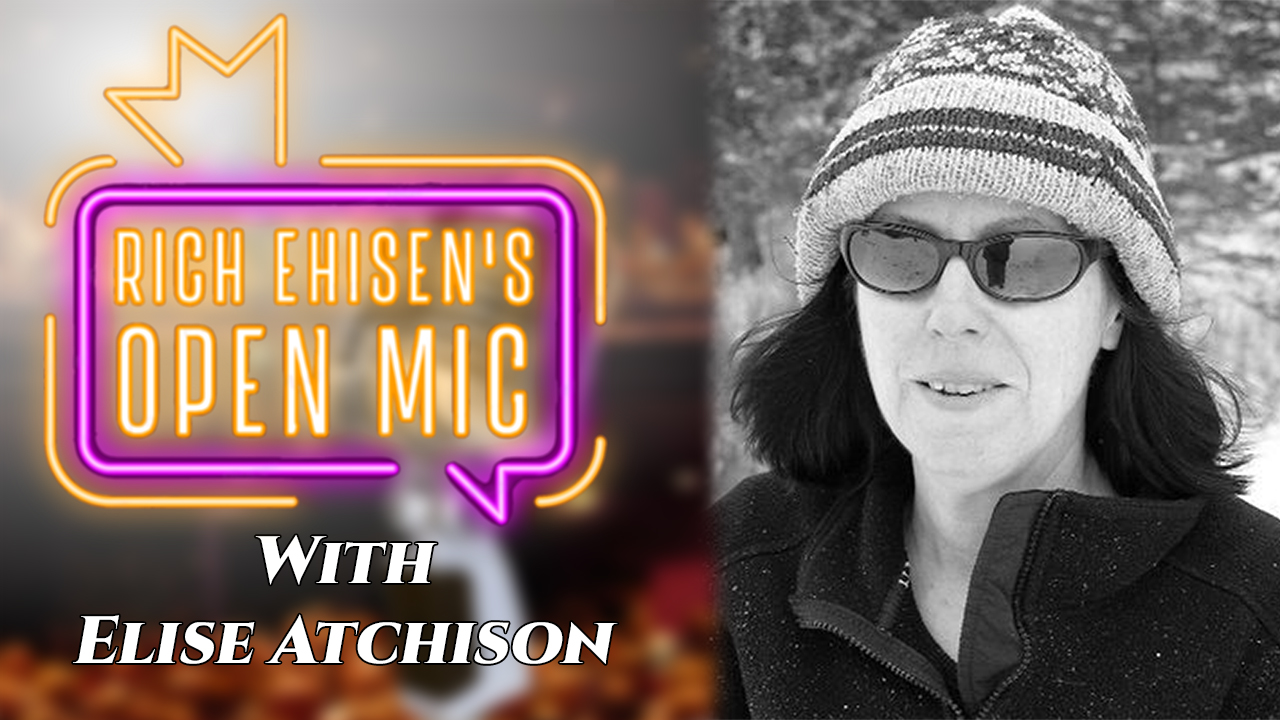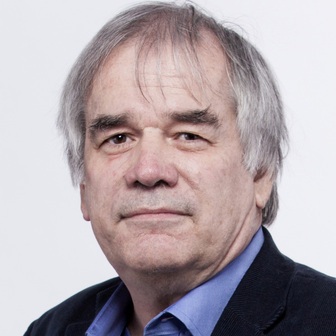
Dana Johnson: A Real California Girl
Author Dana Johnson has been described as “an exacting observer of the beautiful ugly truths of Los Angeles, class, race, being alive.” After reading her outstanding debut novel “Elsewhere, California” and one of her two short story collections, “In the Not Quite Dark,” I wholeheartedly agree. And while Johnson regularly uses her hometown as a backdrop for her storytelling, her stories really comprise the entire cultural tapestry that is California. We sat down with her recently to talk about her work, the pressure on African American writers to focus on race and the role that identity plays in her writing.
Open Mic: Many reviews of your work note your thoughtful, nuanced takes on touchy issues like race, socioeconomic class and family. To me, it seems that maybe what we’re really talking about with all of those issues is our struggles with identity, the way we see ourselves and the way others see us. What’s your take on that? Am I full of it?
Johnson: I guess one way I would think about it is that I write about these things because I feel like our identities are somewhat obscured or mysterious to other people unless we talk about those details of our very specific experiences. So because I’m African American, because I’m a woman, because I come from a working class background, because I’m an academic, because I’m a writer, there are all of these introspections of how I view the world where I’m coming from. So I’m always trying to discuss these nuances. The way we live in the world is not literally black and white. We don’t have these binaries in which we walk through the world. It’s all kind of a mess and a jumble. So when I’m writing I like to try and explore this jumble, to explore the interconnectedness of all these things. So I guess you’re right that it’s an examination of identity in that way. The complications of identity I should say.
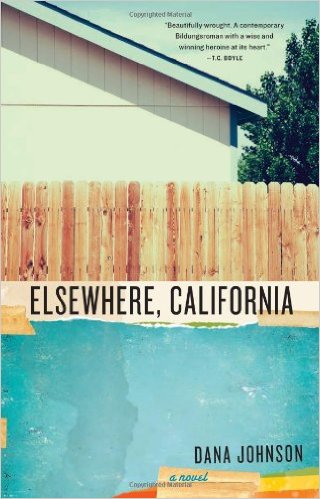
We’re all from somewhere
Open Mic: Along those lines, in reviewing your great collection of short stories, “In the Not Quite Dark,” Publishers Weekly said “Johnson never loses sight of what it can mean to be from somewhere, especially for African-Americans.” That is also a theme to great extent in your novel, “Elsewhere, California,” which I loved. Tell me more about how that desire to be connected to a place influences your work.
Johnson: There’s something about being born and raised in California that in my mind allows for a particular kind of experience, one where you are moving among all kinds of different folks, all different kinds of class backgrounds. And so, much like my character Avery in “Elsewhere,” my family moved from what was then called South Central LA to the suburbs. And to my nine-year-old self there was a startling difference between those two places, even though they both were in California. Which formed my identity: living in a neighborhood where there were only black people and then moving to a neighborhood which at the time, 1976 or so, was mostly white, with some Latinos and some Asians. Moving in this way, sort of learning about how people saw me kind of depending on where I was, was something that I began thinking about even when I was a little kid. Suddenly I was the weirdo or my hair was funny or I talked funny. I’ve been thinking about that my whole life, about ways through my writing to show that when you’re looking at a person you’re not seeing the whole trajectory of their lives. You don’t really understand how their identity is so nuanced and layered.
Open Mic: Which explains the title.
Johnson: In thinking about “Elsewhere California” as a title, I was thinking of a discussion of identity in California beyond the cliché of the “California girl.” Which I am, but I’m a very different kind of California girl than the one people think of when they hear the Beach Boys. Growing up – or even as an adult – I never ever imagined or read a book that had someone like me in it, where blackness as nuance plays prominently. As a coming of age story for a black girl you just don’t see that. And so I wanted to tell that story as a way of encouraging readers to think “Oh wow, I never thought about identity in that way.” Throughout the novel Avery is just trying to figure out a way to be. I think she figures out by the end that all the things she claims from David Bowie to Soul Train is exactly who she is, and she insists on being seen that way by other people rather than just as a black girl, if that makes sense.
Open Mic: Sacramento Bee columnist Dan Walters, who is a great student of California history, believes you can follow our state’s evolution through the works of great writers like Dashiell Hammett, Raymond Chandler and Walter Mosley, because they do such a good job of setting a time and place with their stories. I’ll venture you are very similar in that you can make a city like LA as much a character as any of the people you introduce us too. Talk a bit about the role the city of LA and being a native to the city plays in your work.
Johnson: I think one of my projects as a California writer, a Los Angeles writer, is again reaching toward a specificity that resists the shorthand of what people think California or Los Angeles is, and particularly so in the short story collection “In the Not Quite Dark.” I have lived in downtown LA for a decade now – I came in during gentrification – and I was interested in documenting downtown. All the stories aren’t downtown stories but a lot of them are because contemporary fiction isn’t really looking at that. So some people who read the stories are like “Wow, I didn’t even imagine a Los Angeles like that.” They’re thinking of the beach of the west side of town. But I’m thinking of all these other places, and downtown in particular with all the homelessness. Which gave me the sense of being something I need to talk about in the now, to document how people are living and what it means to be a Los Angelina living in a place like that rather than in Laurel Canyon or something. Those are two just very different places to be. Too often I think Los Angeles is painted with this very broad brush and it just ends up being the shorthand of freeways and palm trees and beaches and Bel Air. I think as a writer writing about place, one of the biggest goals you should have is documenting the specificity of place so that people are always seeing how complicated California is, how complicated Los Angeles is, in terms of who’s living there, what their socio-economic backgrounds are, where they are from before landing in L.A. as immigrants. All of this paints a much more complicated picture of place. One of the huge benefits of landing in a place like California is you get to have the freedom to be who you are, wherever you come from. And then that makes another story, another layer of what makes a state a state and a city a city.
Open Mic: These days we are a living paradox – a society that is perpetually connected by technology but often completely disconnected on a human level. The industry has also changed so much, with much more emphasis in traditional publishing on potential blockbusters, often at the expense of more literary works. What does that do or mean for authors like yourself who tell very literary, very human-centric stories? Will we continue to have room for stories that don’t come with the steady drumbeat of violence or titillation that is easily turned into a movie or a Netflix original series?
Johnson: To the first part of your question, I agree that the publishing industry tends to go towards the books they think will sell and I don’t know that I can necessarily fault them for that. After 9/11 the book industry collapsed. It was like four houses became two houses became one house and so it became harder and harder to get published. So I feel like they have to make money. I get that. But on the other hand, certain stories get told over and over again just because those stories sell. I feel that tension because as an African American women writer, the kind of writing I do doesn’t fit that mold, right? I’m just writing these weird books that are about contemporary life, that are in the now, and I wonder when we look back on what people were writing in the early twenty-first century, are we’re just going to see stories looking backward? So a weird story about some whacky, quirky black girl in California is the type of story I want to write but I’m not sure that’s the type of thing people think will sell. And in fact you know “Elsewhere, California,” went all over the publishing industry [before landing at Counterpoint Press] and I heard all kinds of crazy things. One women said “you know the ebonics at the beginning of the book was really troubling, but once Avery’s voice became assimilated you know I liked it better.” So I feel like there’s a lot of interesting stories being told about things here and now, but maybe they’re smaller, more quiet, more literary fiction that maybe publishers think aren’t going to sell. I just don’t know.
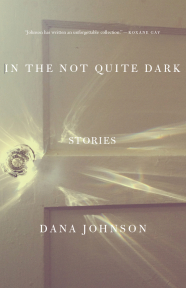
In The Not Quite Dark
Open Mic: You’ve been successful with both short stories and a novel. How, if at all, does your approach to these two genres differ? How is it the same?
Johnson: I love the short story form. I love it. It’s strange but for me writing a short story seems like the more natural process. I feel the beginning, middle and end of a story. It is sort of organic. I know when I’m writing the last sentence that that’s the last sentence. The way I write short stories though is the same as I wrote “Elsewhere,” which was kind of in pieces. I jot down dialogue. I jot down scenes. I would jot down things that I think might be connected in my little notebook and then I just piece the story together and so that way, my process is the same whether I’m writing a novel or a short story collection. But because “Elsewhere” was my first novel, it was really difficult because it seemed so vast. Writing novels seems so never ending, whereas with a short story I could feel the rhythm of the story and know ‘okay, this is feeling like sixteen pages, I think this is where we’re ending’ or ‘no, I’ve got a long way from ending.’ But with the novel I had no idea what I was doing. Especially because I have that duel narrative: I had something taking place all in one day and then I had Avery connecting with that one-day narrative throughout. So there was the narrative progression of her life, and then I was also showing how she became assimilated though language. So that was three things that I was trying to do while just writing a novel that had a beginning, middle, and end. That was really, really difficult for me. Maybe another writer would have had less problems with that, but it just felt very scary, like I was in the middle of the ocean and I couldn’t see land anywhere. I didn’t know how long it was going to take to get back to land with the novel.
Open Mic: Racial issues are inescapable in our society, maybe as much now as ever. As an African-American, do you ever feel compelled to tackle issues like race? Is that something you feel is more expected of you than of someone else?
Johnson: Oh I think it’s definitely expected of me. I think it’s tiresome sometimes to always be expected to write about race. I’m a black writer so I have to write about these things, where writers like Jonathan Franzen can say in an interview “Oh you know, I just write what I write and there are no black characters in my book because I don’t know many black people.” And there’s this sort of privilege in being able to write fiction without thinking about race whatsoever. For example, in the short story collection there are several stories in the collection that don’t necessarily have anything to do with race. They have to do with class or other things. But then other stories do focus on race. But as a black person moving in the world in this body and experiencing what I’m experiencing, oftentimes the world is filtered through race because that’s who I am. I guess the short answer is I resist the expectation that I need to write about these things, and yet the person who I am and where I come from often informs that writing.But at the same time, I don’t feel as though I should be required to always be writing a story in which race appears prominently.
Open Mic: It does feel shocking that here in the year 2016 we’re still having these conversations. I feel silly even having to ask the question but it’s kind of inescapable, you know?
Johnson: Yeah, I don’t know what it would be like to be a black writer who did not even in a circumspect way have race working through their fiction. But again, just the expectation that one should is something that I bristle at because the fact is that sometimes you can’t talk about race without talking about class, without talking about sexism, without talking about homosexuality, like all of these things are interconnected. In the story “The Not Quite Dark” there’s a story about homelessness. The little girl is afraid to go outside because she’s scared of the homeless people that she sees all the time. Because I’m living just a block away from Skid Row this is something I’ve been thinking about for years, and that has nothing to do with race. I mean it does in that how people end up where they end up sometimes connects to these things, but this was just about a little girl who’s afraid of poor people. That was all that was about. Her mother was white and her father was black and I just wrote that into the story because such families exist, but I wasn’t trying to comment about their inter-racial lives in any way. It was more about ‘why can’t we figure out this homeless situation?’ That was the main thing. But that’s an example of how there’s race in there, but it’s not really about that. Another writer may never even think to have an inter-racial couple just matter of fact in a story. They would just make the two people white or something.
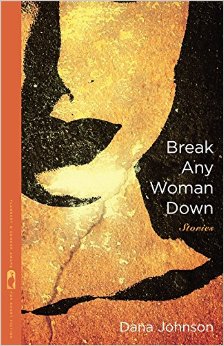
Johnson’s 2001 debut short story collection
Open Mic: One of the many things I loved about “Elsewhere, California” is how you weaved so much tension throughout the story without resorting to any gimmicks, especially at the end. Since this blog is about process, how do you approach your storytelling? Do you have your own internal rules you work by? Are there times when you would be okay with a gimmick or two?
Johnson: It’s so funny, I wish I could learn a gimmick trick. Seriously, I am so terrible at plot. It’s just not my thing. I don’t care about it, I’m not that interested in it. And yet to tell a story you need plot and so my approach to “Elsewhere” was thinking about plot by involving some characters naturally, allowing who people are and what they do to form the trajectory of the story. That is how I approach plot in the short story form as well. But it’s not my strong suit. My fantasy is to write a really tight crime novel and I just don’t think I’ll ever be able to do it because I just don’t write plot like that. So I really appreciate you saying that you still felt these tensions and all of that in “Elsewhere” even though there weren’t specific gimmicky plot things happening. Because I don’t do it. I probably don’t know how to do it, and characters are everything for me, so that’s how the plot happens.
Open Mic: Staying with “Elsewhere,” I was so worried about Avery’s nephew Dae-Jung at the end, which I think anyone who is remotely aware of how things are for young black males in our society right now would feel. But again, no gimmicks, just the message about needing to “show up ready to fight,” to “put one foot down and then the other until you get to where you’re going, until you’re there.” That seems so relevant to our world right now, even though you wrote those words long before the election. And within it all, some humor and some light. Do you ever reflect back on things you wrote like this?
Johnson: Once I’m done I tend to just move forward and not look back. So sometimes I’m talking about a book or a short story and I might even forget the character’s name or a kind of important point. I’ve already moved on. In some general sense, of course, I remember my books and remember major plot points and stuff, but a lot of times I’ve just moved on. I don’t really look back. So I haven’t read “Elsewhere” since it was published. If I do a reading, I’ll just pull out a section, maybe read the prologue or one section, but I tend not to look back on the books. It’s a really interesting thing because I’ll look at a line and be like, ‘Where does that even come from? I don’t even remember writing that. How did I get there?’ I just don’t remember.
Open Mic: I’d like to end with something fun I do with some of my subjects here at The Open Mic. Let’s say you could have coffee or drinks with only one of the following people: Ernest Hemingway, Dusty Baker or Hillary Clinton. Who would you choose and why?
Johnson: I would probably choose Dusty Baker just because he was such a seminal figure when I was a kid for watching that 80’s Dodgers team where they were all together for so many years. And he was my grandmother’s favorite player. I still have her Dodger’s jacket, even though she passed away many, many years ago. She had that blue satin Dodger’s jacket with the number 12 on the back and her name, which was Magnolia, stitched in the front. He was her guy, and so I would love to sit down and talk to Dusty Baker about playing on the team in those years and tell him about how much my grandmother loved him. So even though Ron Cey was my guy, I would love to have a sit down with Dusty Baker.

